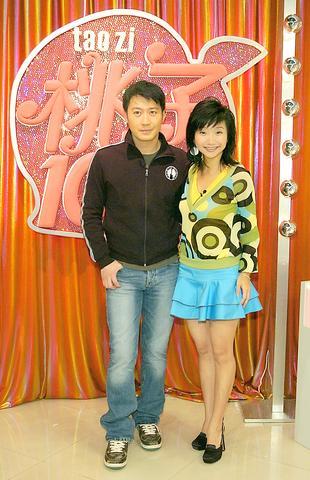In one of the more dramatic scenes from Infernal Affairs, Tony Leung (梁朝偉) and Andy Lau (劉德華) face off on the roof of a Hong Kong skyscraper trading barbs on their respective treasonous ways. But in an on-line Taiwanese-dubbed version of the scene being sent around in mass e-mails, Lau is an audiophile gearhead lamenting his inability to find products with CD-Pro2 technology. In the clip, Lau wants to buy a stereo with the new sound module and Leung taunts him by saying he's already got two, and even knows someone who has 20 CD-Pro2 systems. Then Leung says he'll sell one system for an exorbitant $200,000, to which Lau responds that he's a "real bastard."
A second clip features the two in a stereo store enjoying the perfect response of CD-Pro2 stereos. What is in the original version another tense encounter between the two stars is transformed through the new overdub into a pair of tech geeks having knee-tremblers over superior sound quality. The voices and dubbing are uncannily well done. Check the clips at: http://myweb.hinet.net/home6/shoda/cdpro2.wmv, http:// myweb.hinet.net/home6/shoda/cdpro2-2.wmv and myweb.hinet.net/home6/shoda/cdpro2-mtv.wmv.
Lau is also starring in Magic Kitchen (魔幻廚房), which is currently playing in Taiwan, but if you blink it may already have left the theaters. The movie co-stars Sammi Cheng (鄭秀文), Maggie Q and Jerry Yen (言承旭) of the boy band F4, but even that much star power hasn't been enough to help the flick break the NT$1-million mark in ticket sales over two weeks. Nevertheless, its take at the box office is considered a fairly good result for Chinese-language movies these days, sad as that may sound.

PHOTO: TAIPEI TIMES
Competition is just as fierce on the little screen these days and the past week has seen a raft of new TV shows take to the air.
Momoko Tao (陶晶瑩) is back on Azio TV, Monday through Wednesday, at 10pm, with a fashion commentary show after her racy talk show was discontinued late last year for offending the community standard through its blunt treatment of, well, mostly just sex. This time the topic up for discussion, with a long list of celebrity guests already lined up, will be fashion -- which should be easy enough to lead into the jucier subject of sex.
Formosa TV (民視) and SET-TV (三立台) have squared off this week in a head-to-head prime-time battle with two new shows in the hotly contested 8pm time slot. On Monday, Formosa TV's Life of Desire (慾望人生) pulled ahead of SET-TV's Taiwan Tornado (龍捲風) with a modestly higher rating, according to an AC Nielsen poll. The following day Life of Desire's producer Cheng Chao-cheng (鄭朝城) gloated over the superior rating, telling reporters he had already bought a one-way ticket for Taiwan Tornado's script writer Cheng Wen-hua (鄭文華) to go back to Hong Kong. Reports in several local papers had the two men going for the jugular in the week leading up to their shows' face-off, calling each other's scripts garbage and "daring" the loser to retire from the business.

PHOTO: TAIPEI TIMES
Chinese-language movies didn't appear on the Oscar radar screen on Sunday, but at least Wong Kar Wai (王家衛) got a shout out from Sophia Coppola, who credited the director with providing inspiration for the script for Lost in Translation, which won best screenplay. Hong Kong's Apple Daily (蘋果日報) reported on Wednesday that Wong hadn't watched the ceremony nor Coppola's movie, because he's too busy filming his sci-fi drama 2046, but said he'd get around to it "soon," which might suggest that the filming of the movie is finally nearing completion after innumerable delays.

One of the biggest sore spots in Taiwan’s historical friendship with the US came in 1979 when US president Jimmy Carter broke off formal diplomatic relations with Taiwan’s Republic of China (ROC) government so that the US could establish relations with the People’s Republic of China (PRC). Taiwan’s derecognition came purely at China’s insistence, and the US took the deal. Retired American diplomat John Tkacik, who for almost decade surrounding that schism, from 1974 to 1982, worked in embassies in Taipei and Beijing and at the Taiwan Desk in Washington DC, recently argued in the Taipei Times that “President Carter’s derecognition

This year will go down in the history books. Taiwan faces enormous turmoil and uncertainty in the coming months. Which political parties are in a good position to handle big changes? All of the main parties are beset with challenges. Taking stock, this column examined the Taiwan People’s Party (TPP) (“Huang Kuo-chang’s choking the life out of the TPP,” May 28, page 12), the Democratic Progressive Party (DPP) (“Challenges amid choppy waters for the DPP,” June 14, page 12) and the Chinese Nationalist Party (KMT) (“KMT struggles to seize opportunities as ‘interesting times’ loom,” June 20, page 11). Times like these can

June 23 to June 29 After capturing the walled city of Hsinchu on June 22, 1895, the Japanese hoped to quickly push south and seize control of Taiwan’s entire west coast — but their advance was stalled for more than a month. Not only did local Hakka fighters continue to cause them headaches, resistance forces even attempted to retake the city three times. “We had planned to occupy Anping (Tainan) and Takao (Kaohsiung) as soon as possible, but ever since we took Hsinchu, nearby bandits proclaiming to be ‘righteous people’ (義民) have been destroying train tracks and electrical cables, and gathering in villages

Dr. Y. Tony Yang, Associate Dean of Health Policy and Population Science at George Washington University, argued last week in a piece for the Taipei Times about former president Ma Ying-jeou (馬英九) leading a student delegation to the People’s Republic of China (PRC) that, “The real question is not whether Ma’s visit helps or hurts Taiwan — it is why Taiwan lacks a sophisticated, multi-track approach to one of the most complex geopolitical relationships in the world” (“Ma’s Visit, DPP’s Blind Spot,” June 18, page 8). Yang contends that the Democratic Progressive Party (DPP) has a blind spot: “By treating any